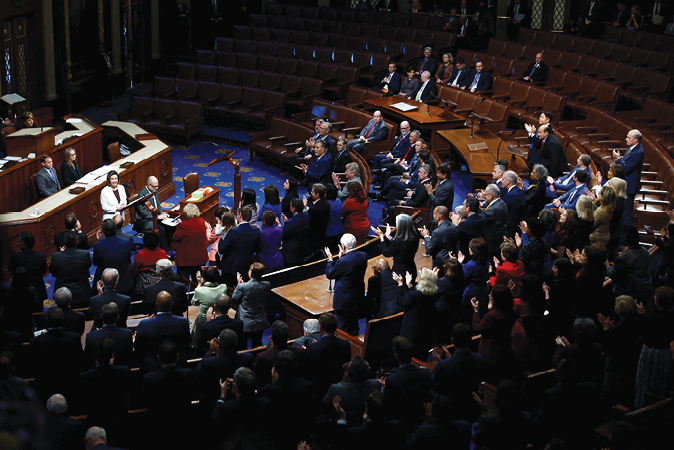|
By Amanda Hampton, Junior Associate,
Blakey & Agnew
Once again, this year’s midterm election predictions were failed by pre-election polling. What was expected to be a noticeable shift to a Republican controlled Congress ended with the party only gaining a narrow majority in the House. As expected, there is much to break down from the midterm elections and what it means for the 118th Congress. But before that, the 117th Congress still has work to do prior to moving on and focusing on the next Congress.
This year’s lame-duck session has already been eventful with both Congress and the Biden-Harris Administration working to avoid a potential rail strike that was set to begin on December 9. President Biden signed legislation into law on December 2 resolving disputes between railroads and their unions. While the signed legislation did not include one of the unions’ main priorities – paid sick leave – employees will still receive a 24 percent pay raise by 2024. Also on the legislative agenda in the final months of 2022 will be fiscal year 2023 appropriations. Legislators will seek to develop a solution for when the continuing resolution serving as the government’s current form of funding expires on December 16. Congress must either pass a second continuing resolution to avoid a government shutdown or prepare a full appropriations bill for fiscal year 2023. Notably, in fiscal year 2022, the government operated under continuing resolutions until March.
Once legislators make it through their agenda for 2022, there is little time before ushering in the new Members of Congress. As it stands, the Senate election outcomes indicate a 50-49 Democrat majority regardless of the Georgia runoff election. If Herschel Walker, the Republican candidate, wins the runoff and brings the Senate balance to 50-50, Vice President Harris would act as a tiebreaker. While one House seat remains uncalled, Republicans regained control of the chamber and currently have a 221-213 majority.
Following the midterms, Speaker of the House Nancy Pelosi (D-CA) announced her plans to step down from her leadership position. Democrats have already elected Hakeem Jeffries (D-NY) to the House minority leader position. As for the majority party, House Republicans selected Kevin McCarthy (R-CA) as their nominee for the Speaker of the House by a 188-31 vote. With 31 Republicans currently not supporting McCarthy’s nomination, it is unclear whether he will receive the majority needed to assume the leadership position when the full House takes its vote in January. Other House leadership changes will include Sam Graves (R-MO) becoming the chair of the House Committee on Transportation and Infrastructure. For the minority party on the committee, Peter DeFazio (D-OR) will retire, allowing either Rick Larson (D-WA) or Eleanor Holmes Norton (D-DC), the two next most senior Democrats on the committee, to become the
|

ranking member.
Despite Democrats maintaining their Senate control, there are still several leadership changes to expect. Senators Patrick Leahy (D-VT) and Richard Shelby (R-AL), the two party leaders on the Senate Committee on Appropriations, are retiring. Patty Murray (D-WA) will assume the chair position, and though not confirmed, Susan Collins (R-ME) is expected to become the ranking member. In November, Senate Majority Leader Chuck Schumer (D-NY) announced plans to nominate Murray as the Senate President Pro Tempore, which would make her the first woman elected to the position.
When the 118th Congress convenes for the first time on January 3, it will vote on key leadership positions, including Speaker of the House and Senate Pro Tempore. As always, Congress will determine committee assignments shortly after the start of the new year.
As we gain more clarity into the makeup of the next Congress, we know for certain legislators will face unique challenges as both chambers navigate governance under thin majorities. Congress will prepare to act on some must-pass bills, such as the Federal Aviation Administration (FAA) Reauthorization Act, since the current authorization is set to expire at the end of fiscal year 2023. The Senate Committee on Commerce, Science, and Transportation has already begun its efforts to craft its policy priorities in the FAA reauthorization. Earlier this year, the committee convened a hearing to explore various topics, including emerging aircraft technologies, managing airspace, and the infrastructure needed to allow for the deployment of advanced air mobility and unmanned aerial systems operators.
Republicans over the past year have consistently expressed concerns over the implementation of the Bipartisan Infrastructure Law and the amount of spending by the Biden-Harris Administration. We can expect additional oversight from Republicans in the next Congress surrounding these issues. With a new divided Congress, an FAA reauthorization bill, and the need to enact fiscal year 2023 appropriations legislation, the new Congress will certainly be off to a busy start.
Blakey & Agnew, LLC is a public affairs and
communications consulting firm based in
Washington, DC.
|

